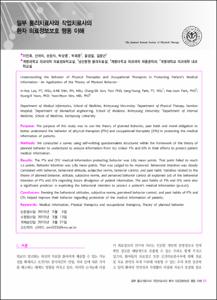KUMEL Repository
1. Journal Papers (연구논문)
1. School of Medicine (의과대학)
Dept. of Medical Humanities (의료인문학)
일부 물리치료사와 작업치료사의 환자 의료정보보호 행동 이해
- Keimyung Author(s)
- Yoon, Kyung Il; Park, Hee Jun; Kim, Yoon Nyun
- Department
- Dept. of Medical Humanities (의료인문학)
Dept. of Biomedical Engineering (의용공학과)
Dept. of Internal Medicine (내과학)
- Journal Title
- 대한물리치료학회지
- Issued Date
- 2010
- Volume
- 22
- Issue
- 2
- Abstract
- Purpose: The purpose of this study was to use the theory of planned behavior, past habit and moral obligation to better understand the behavior of physical therapists (PTs) and occupational therapists (OTs) in protecting the medical
information of patients.
Methods: We conducted a survey using self-writting questionnaires structured within the framework of the theory of planned behavior to understand to analyze information from 103 clinical PTs and OTs in their efforts to protect patient
medical information.
Results: The PTs and OTs’ medical information protecting behavior was 2.85 mean points. That point failed to reach 1.0 points. Behavior intention was 3.83 mean points. That was judged to be improved. Behavioral intention was closely
correlated with behavior, behavioral attitude, subjective norms, behavior control, and past habit. Variables related to the theory of planned behavior, attitude, subjective norms, and perceived behavior control all explained 50% of the behavioral intention of PTs and OTs regarding future divulgence of patient information. The past habits of PTs and OTs were also a significant predictor in explaining the behavioral intention to protect a patient’s medical information (p<0.01).
Conclusion: Revising the behavioral attitudes, subjective norms, perceived behavior control, and past habits of PTs and OTs helped improve their behavior regarding protection of the medical information of patents.
Key words: Medical information, Physical therapists and occupational therapists, Theory of planned behavior
- Alternative Title
- Understanding the Behavior of Physical Therapists and Occupational Therapists in Protecting Patient’s Medical
Information – An Application of the Theory of Planned Behavior –
- Publisher
- School of Medicine
- Citation
- 이인희 et al. (2010). 일부 물리치료사와 작업치료사의 환자 의료정보보호 행동 이해. 대한물리치료학회지, 22(2), 55–60.
- Type
- Article
- ISSN
- 1229-0475
- 파일 목록
-
-
Download
 oak-bbb-882.pdf
기타 데이터 / 719.74 kB / Adobe PDF
oak-bbb-882.pdf
기타 데이터 / 719.74 kB / Adobe PDF
-
Items in Repository are protected by copyright, with all rights reserved, unless otherwise indicated.